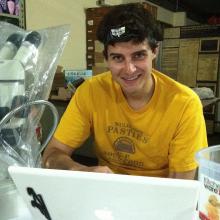Field & Lab Team
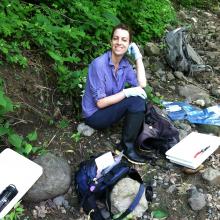 Stefanie Kautz, Ph.D.
Stefanie Kautz, Ph.D.
Postdoctoral Researcher
Integrative Research Center (Insects)
Field Museum of Natural History
I joined Corrie Moreau's lab group after completing my Ph.D. at the University of Duisburg-Essen in Germany in 2009, and I currently hold a fellowship from the German Academy of Sciences, Leopoldina, to pursue my research projects.
I work on interspecific interactions involving a wide range of organisms such as insects, plants, and microbes. In collaboration with Dr. Moreau and her lab group, I study the interaction of ants with microbes. As in humans, gut microbes can help ants to digest certain foods, but also support the immune system, or function as pathogens. I mainly focus on two groups of ants to understand the role of bacteria for these organisms. In acacia ants, I question whether Wolbachia, a potential reproductive manipulator, might affect colony structure. Using the giant Neotropical bullet ant Paraponera clavata as a model, I'm involved in disentangling the effects of diet and geography on microbial communities.
I have conducted field research in various countries, including Costa Rica, Ecuador, Germany, Madagascar, Mexico, Peru, and the United States.
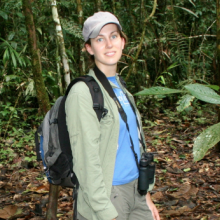 Elizabeth G. Pringle, Ph.D.
Elizabeth G. Pringle, Ph.D.
Postdoctoral Fellow, Michigan Society of Fellows
University of Michigan
I am a Postdoctoral Fellow at the University of Michigan, where I came to continue my research and teach after completing my Ph.D. at Stanford University in 2011. My research focuses on the ecology of mutually beneficial species interactions (mutualisms), and specifically on the feedbacks between such interactions and the environments in which they are embedded.
I have been working in the Area de Conservación Guanacaste in northwestern Costa Rica since 2003, with a particular focus on ant-plant interactions in the region. Much of my research has been conducted on a highly specific mutualism between ants and Cordia alliodora trees, in which trees provide food and shelter for ant colonies, and, in theory, ants protect the tree from the animals that eat it. In this system, ants are not as good at protecting trees in Costa Rica as they are in other parts of the species range (e.g., Mexico), and determining why and how this geographic variation exists is one of the driving questions of my research.
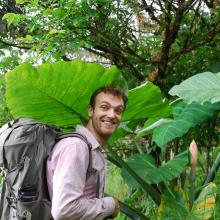 Benjamin Rubin
Benjamin Rubin
Graduate Student
University of Chicago and Field Museum of Natural History
I am currenlty a Ph.D. student in the Committee on Evolutionary Biology at the University of Chicago and the Division of Insects at the Field Museum. I joined the Moreau Ant Lab at the Field Museum in 2009 after completing my undergraduate degree at Cornell University.
I study the evolution of behavior in mutualistic acacia ants. My research focuses on changes in the genome that influence this behavior and the way that the bacteria associated with these ants may have made mutualism possible. Broadly, I'm interested in behavioral genomics in social insects.
I've not traveled nearly as extensively as some members of the team, but my ant research has already taken me to Kenya, Peru, across the United States, and now, Costa Rica.
Max Winston
Graduate Student
University of Chicago and Field Museum of Natural History
I'm a third-year graduate student in the Committee on Evolutionary Biology at the University of Chicago and the Division of Insects at the Field Museum. I'm interested in mechanisms of diversification and their relationship with developmental processes. To investigate these interests, I'm utilizing phylogenomic methods to test several models of Amazonian speciation in Neotropical army ants (Genus: Eciton), and integrating this genetic data with traditional and geometric morphometrics to understand the evolution of morphological castes.
I began my career at Princeton University where I majored in Ecology & Evolutionary Biology with a certificate in Environmental Studies. Working with the Smithsonian Tropical Research Institute in Gamboa, Panamá, my undergraduate thesis focused on the affect of human development on the most important Neotropical herbivore; the leafcutter ant. Following graduation, I taught high school science as part of a Princeton in Asia Fellowship in Korea, and worked in urban planning in Chicago at the Center for Neighborhood Technology. My broad interests include science education, the role of science in society, and scientific applications.
Currently, my research is focused on using novel bioinformatics methods such as restriction-site associated DNA sequencing (RAD-seq) to understand the rich evolutionary history of the wide-ranging Neotropical army ant species. This work will contribute to understanding how the unparalleled biodiversity of the Amazon has been generated, and the role of this top predator over evolutionary time.
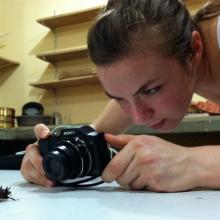 Alexandra Westrich
Alexandra Westrich
Research Assistant and Imaging Technician
Field Museum of Natural History
I am a research assistant in Corrie Moreau’s Ant Lab at The Field Museum of Natural History. I joined the lab shortly after graduating from the School of the Art Institute of Chicago in 2009. I've contributed extensively to the curation, databasing, and imaging of ant specimens in the Museum’s collection, while also using my artistic skills to draw attention to research efforts at The Field, from small, hand-made zines to the illustrated 2010 Field Museum exhibit Romance of Ants.
In Costa Rica, I helped the team track and collect ants on outings to the field, but I spent the majority of my time in the lab dissecting ant guts and preparing fluorescent DNA stains of their contents to check for the presence of bacterial endosymbionts. The resulting photographs (see the photo galleries) said a lot about different species’ diets, but they also furnished the imagination with visions of a theoretical sci-fi realm where some future graphic novel would no doubt unfold.
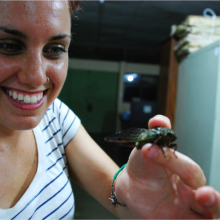 Arista Tischner
Arista Tischner
Undergraduate Student
University of Illinois at Chicago
I came to The Field Museum as an undergraduate intern. As a senior year biology student with interests spanning ecology, animal behavior, and genetics, working with the ant lab team has proven to be an exciting place for me to gain experience. I've worked under the direction of Dr. Corrie Moreau, Dr. Steffi Kautz, and Ben Rubin on multiple projects, including colony growth strategies of acacia ants, tracing the origin of the bullet ant, and a large wet-collection databasing project.

